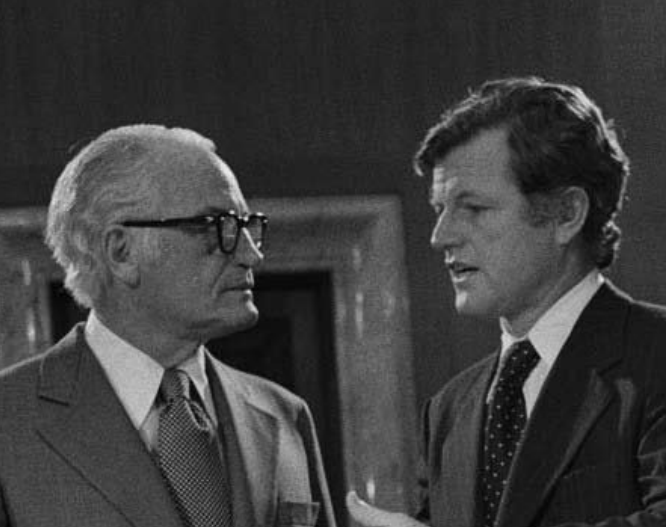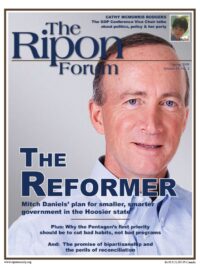During his campaign for President, Barack Obama promised many things. One of his promises was to govern from the middle. Yet four months into his administration, it has become increasingly clear that he faces two main obstacles in fulfilling this promise and achieving this goal. The obstacles are Nancy Pelosi and Harry Reid.
One is a San Francisco limousine liberal with a lifetime ADA rating of nearly 100 percent. The other is an old-fashioned big government Democrat who supports building a “mob museum” in his home state of Nevada as a way to stimulate the nation’s economy. Together, they represent not only Obama’s greatest obstacle in moving to the center, but his biggest barrier in accomplishing something Republicans failed to do when they controlled both ends of Pennsylvania Avenue – get spending under control.
In response to these concerns, Obama pledged during the campaign to take a “scalpel” to the federal budget. After his election, he also announced plans to appoint a “performance officer” to make sure tax dollars are well spent. Unfortunately, with the deficit at more than $1 trillion and government spending consuming more than 20 percent of the economy, the new president will need more than a figurative scalpel and figurehead appointee to get the job done. He will need something with teeth in it, something that been proven to work, something both Democrats and Republicans can support. In short, he will need a Sunset Commission. Here’s why:
1. The actions of a Sunset Commission are binding. Under this process, an expiration date is placed on all new federal programs. When the expiration date is reached, a bipartisan Sunset Commission — comprised of elected and unelected officials – meets to review whether the program is still needed. If the answer is no, the program is abolished If the answer is yes, the program is continued for another set time, with changes made as needed to ensure the program is still working as originally intended.
The recommendations of the commission are then presented to Congress, and an up-or-down vote is held. The intent is to take politics out of the equation and make the needed hard decisions. But the larger goal of a Sunset Commission is to make government smaller and smarter. This leads to the second reason President Obama should consider the idea:
2. Sunset Commissions have been proven to work. Colorado approved the first Sunset law in 1976. Twenty states had enacted some form of Sunset law by 2002. Texas has perhaps the nation’s most successful Sunset program. Since its creation in 1978, the state Sunset Commission has abolished 52 agencies and consolidated another 12. In the process, it has saved Texas taxpayers nearly $728 million. Unsurprisingly, it has also won the enthusiastic support of Republicans and Democrats alike.
That leads to the third reason a Sunset Commission is something the president should support:
3. A Sunset Commission has bipartisan roots. Indeed, it’s not just Republicans and Democrats in Texas who have supported establishing a Sunset Commission. Republicans and Democrats in our nation’s capital have backed the idea as well. In recent years, the GOP has championed the proposal. Yet 30 years ago in Washington, establishing a Sunset Commission was an idea embraced by Democrats.
“In recent years, the GOP has championed the proposal. Yet 30 years ago in Washington, establishing a Sunset Commission was an idea embraced by Democrats.”
In fact, in 1977, it was one of the top three priorities on Capitol Hill. The top priority, S.1, was a jobs bill aimed at easing unemployment, which stood at 7.5 percent when Jimmy Carter took office. The third priority, S.3, was a bill to reform health care. The second most pressing priority, S.2, was a bill to get federal spending under control by establishing a federal Sunset Commission.
The bill’s main sponsor was Edmund Muskie, the legendary Democratic senator from Maine. Its supporters ranged from Republicans Barry Goldwater and Jesse Helms to Democrats George McGovern and Edward Kennedy. “I regard the sunset concept as one of the most imaginative and innovative approaches to government reform that has been proposed in many years,” Kennedy said.
All told, S.2 had 59 cosponsors in the Senate – 30 Democrats, 28 Republicans and one independent. In the House, the bill had more than 150 cosponsors, including such conservative Republicans as Mickey Edwards and Bob Walker and such liberal Democrats as Dick Gephardt and Shirley Chisholm. President Carter also backed the plan, as did interest groups ranging from the Chamber of Commerce to Common Cause.
Perhaps Muskie summed it up best when explaining the reason the idea enjoyed such broad political support. “Conservatives see this as a way of reducing the responsibilities of government,” he explained, while it is viewed by “liberals as a way of getting our house in order to take on new responsibilities.”

“Its supporters ranged from Republicans Barry Goldwater and Jesse Helms to Democrats George McGovern and Edward Kennedy.”
The Senate overwhelmingly approved S.2 by a vote of 87-1 in October 1978. Unfortunately, the bill was never voted on in the House, and the idea was never seriously considered again. It should be considered now for the reasons previously discussed – the idea is binding, proven and bipartisan.
But there’s another reason President Obama might find the establishment of a Sunset Commission appealing: The idea originated in his hometown.
In 1969, University of Chicago Professor Theodore Lowi published a book called “The End of Liberalism.” In that book, he first suggested establishing a “Tenure-of-Statute” act, which would require any law that created a federal agency to expire in five to 10 years. When Mr. Lowi’s idea was later considered by Congress, another Chicagoan, Abner Mikva, testified in its support, saying a Sunset Commission “would force on us a discipline of reviewing what we have done in established periods of time.”
At the time of his testimony, Mikva was serving in the House of Representatives. He would later go on to serve as a mentor for Barack Obama. In 2006, he counseled the young senator to seek the White House. His advice helped convince Obama that the time was right then to pursue the presidency. Perhaps his testimony will convince Obama that the time is right now to pursue another bold idea – establishing a Sunset Commission.
It is an idea that would not only provide the President the scalpel he needs to cut the federal budget, but one that would also help him overcome the obstacles he is likely to face on Capitol Hill.
Lou Zickar is the editor of The Ripon Forum.




